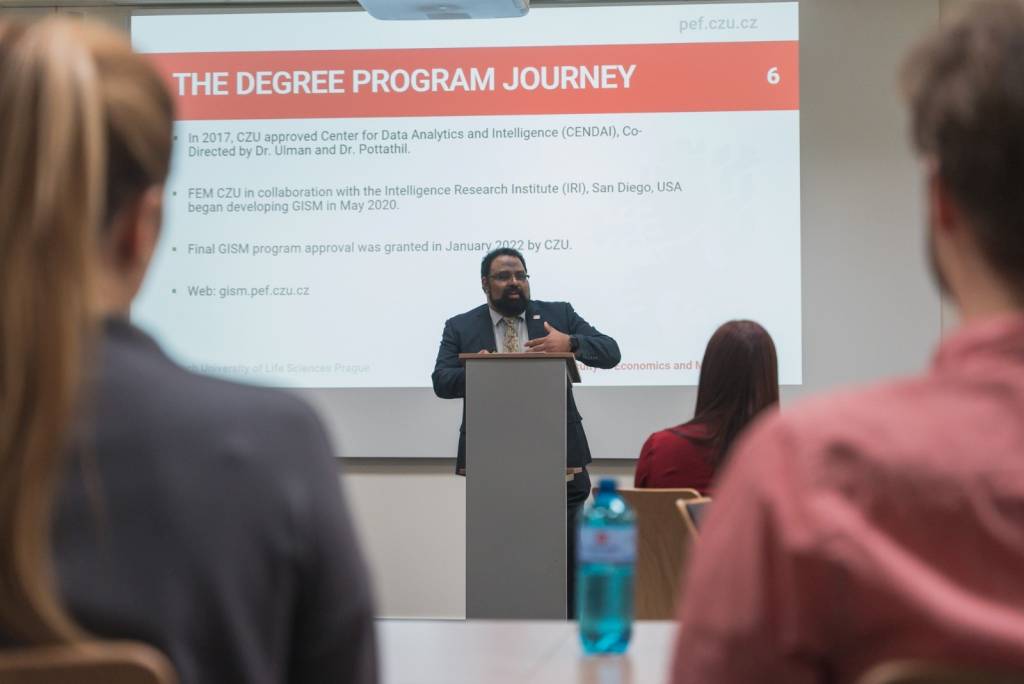
Studijní program GISM byl akreditován v lednu 2022 a jeho garantem je doc. Ing. Jiří Vaněk, Ph.D., z Katedry informačních technologií PEF ČZU v Praze. Program bude vyučován v anglickém jazyce s účastí zahraničních lektorů. Koncipován je multioborově a je zaměřen na přípravu odborníků v oblasti informačních technologií a datové analytiky pro řešení nových výzev globální společnosti, které mají zásadní dopady na současný obchod, služby a veřejné instituce.
Akreditace nového programu je výsledkem dlouhodobé spolupráce PEF s partnery ze San Diega, která probíhá už více než osm let formou akademických mobilit studentů a pedagogů a společného výzkumu. V roce 2017 bylo na Katedře informačních technologií PEF ČZU založeno Center for Data Intelligence and Analytics (CENDAI) jako platforma pro mezinárodní spolupráci při řešení aktuálních výzev v oblasti technologií, bezpečnosti a obchodu.
O podrobnosti k novému studijnímu programu, ale i k vzájemné spolupráci českých a amerických odborníků na bezpečnost, jsme požádali Dr. Akshaye Pottathila.
„Absolventi programu Global Information Security Management dostanou příležitost získat vhled a doménovou znalost v oblasti informační bezpečnosti a měli by být schopni řešit nové výzvy, jimž budou organizace v budoucnu čelit. V průmyslové sféře jde především o důvěrnost, integritu a dostupnost dat. Data organizací jsou obvykle uložena na serverech, v počítačích nebo na cloudové platformě. V mnoha případech jsou ta zařízení umístěna někde v kanceláři, záleží na vyspělosti organizace. To vše dokáže systém řízení informační bezpečnosti ochránit. Nejen samotný kybernetický prostor, ale také bezpečné propojení reálného a elektronického světa. Studenti budou vystaveni manažerským dovednostem a představě o reálném provozu, které jsou zapotřebí pro vstup do pracovního procesu. Z toho budou čerpat po celou dobu své kariéry, což je dnes důležitější než kdy jindy. Konečnou vizí tohoto programu je zajištění úrovně fyzické bezpečnosti v souladu s prostorovou analytikou na globální úrovni. To je to, co si žádá budoucí vývoj.“
Jak vidíte využití tohoto programu v regionálních podmínkách?
„Na tomto programu jsme pracovali během pandemie covidu-19. Mou specializací je vnitřní bezpečnost. Jsem zvyklý vytvářet možnosti dalšího rozvoje, jakmile vyvstane potřeba. Proto jsme se snažili odhadnout scénáře, kam se svět vyvíjí, jaké trendy se objevují, co budou dělat naši studenti a jaké možnosti zaměstnání budou existovat. To je dnes v tomto regionu mnohem důležitější než dříve. A pro Českou republiku je to zvlášť aktuální ve světle hrozeb v tomto regionu. Je ale potřeba si uvědomit, že mnoho studentů je ze zahraničí a někteří i z oblastí, kde zažili již to, co zde považujete za nové.“
Jakým výzvám budou absolventi schopni čelit?
„Nadnárodní korporace, které chtějí zabránit kybernetickým útokům, nepotřebují někoho, kdo by rozuměl jen jedné formě řízení informační bezpečnosti. Potřebují toho, kdo bude schopen propojit reálný a současně digitální svět.“
Jak hodnotíte spolupráci ČZU a vašeho institutu v San Diegu?
„Vztah mezi IRI a ČZU je založen na přátelských vztazích a vzájemném respektu mezi jednotlivými kolegy. V oblasti mezinárodní bezpečnosti se tomu říká trust network. Před mnoha lety mě na univerzitu pozval tehdejší vedoucí Oddělení mezinárodních vztahů PEF Dr. Vlastimil Černý. A od té doby jsme vytvořili nejen tento magisterský studijní program, ale také Center for Data Intelligence and Analytics. Spolu se současným vedoucím Ing. Janem Hučkem, Ph.D. a Ing. Milošem Ulmanem, Ph.D., který spolu se mnou toto centrum řídí, a dalšími profesory se tento vztah vyvinul a umožnil vytvoření inovativního akademického programu. Nyní se tedy můžeme věnovat výzkumu na magisterském stupni, kde využíváme střední Evropu k prozkoumání širšího kontextu za hranicemi regionu. V Americe se dříve o bezpečnosti hodně diskutovalo, zejména v souvislosti s poskytovateli technologií. Dnes je to záležitost navrácení vedoucího postavení USA a Evropě, abychom mohli pokračovat v dodávání řešení rozvíjejícím se společnostem. Pracujeme se zahraničními partnery a studentům vytváříme odrazový můstek, aby mohli přispívat k chodu strategicky důležitých společností prostřednictvím vytváření spolehlivých řešení.“
Jak vnímáte možnost vyučovat program GISM na Provozně ekonomické fakultě?
„Velmi si cením pohostinnosti této fakulty a nadšení studentů. Věřím, že můžeme ze studentů vytvářet znalostní pracovníky pro budoucnost.“
Kdybyste měl srovnat atmosféru na ČZU s americkými univerzitami, jsou to velké rozdíly?
„Ne, v Americe máme také mezinárodní programy. A studenti jsou stejní, protože pocházejí ze stejných částí světa. Pracoval jsem v mnoha zemích a vždy říkám: Programy se skládají z učitelů a zážitku studentů, kteří v ideálním případě přispívají k vzájemnému nárůstu znalostí a úspěchu. Jsem toho názoru, že kromě teorie je také třeba ukázat praxi. Vždyť jde o budoucnost dětí. A úspěch studentů je odrazem toho, co je učíme a co na ně zapůsobí. Naším úkolem je ukázat jim cestu a umožnit jim samostatně pokračovat a využívat při tom společně vytvořené nástroje.“
Spoluautorem studijního programu Global Information Security Management je Ing. Miloš Ulman, Ph.D., který je také spoluředitelem Center for Data Intelligence and Analytics (CENDAI) a odborným asistentem Katedry informačních technologií PEF. Zeptali jsme se, jak hodnotí skutečnost, že tento prestižní program bude zaveden právě na PEF?
„Naše spolupráce trvá už od roku 2016 a my si jí velmi vážíme. Vytvoření a akreditace tohoto programu je takovým pomyslným a důležitým milníkem. Určitě to vnímáme jako příležitost, která otevírá dveře k další spolupráci.“
Kolik studentů se může do programu zapsat?
„Naším cílem je přijmout do prvního ročníku alespoň třicet studentů. Cílíme hlavně na studenty ze zahraničí, ale počítáme s tím, že postupně budou mít zájem i studenti z Česka. Myslím, že přidanou hodnotou pro ně je, že tu budou učit odborníci ze zahraničí.“
Jaká jsou podle vás největší rizika, která je třeba řešit v regionálních podmínkách? A jaké bude uplatnění studentů tohoto programu?
„Podle mého názoru jsou velkými riziky přerušení dodavatelských řetězců a nepřátelské chování cizích vlád, které velmi ovlivňuje českou společnost, geopolitiku a regionální ekonomiku. Takže studenti dostanou možnost chápat širší souvislosti většiny problémů, proč se to či ono děje. Budou se moci učit jak od místních odborníků, tak od specialistů ze zahraničí.“
Ve kterých oblastech se u nás nejvíc uplatní?
„Typická zaměstnání pro absolventy tohoto programu jsou zaměstnanec nebo manažer informační bezpečnosti, datový analytik, pracovník týmu, který implementuje software pro společnosti, ale i pozice v soukromém a veřejném sektoru, kde absolventi budou vytvářet bezpečnostní politiku.“
A jak hodnotíte spolupráci s americkým institutem?
„Setkali jsme se s dr. Pottathilem, když přijel učit na pozvání dr. Černého, a hned jsme začali spolupracovat. Spolupráce mezi dvěma pedagogy přerostla v institucionální spolupráci. Postupně se nám podařilo vybudovat tým kolegů, kteří s námi spolupracují. A nejnovějším výsledkem je právě tento program.“
Je to první program svého druhu, nebo se na ČZU něco podobného již studuje?
„Na naší fakultě je akreditován magisterský a bakalářský program Informatika a jeho obdoba v angličtině – Informatics. V těchto programech se učí základy počítačové a informační bezpečnosti, takže program GISM je první svého druhu v České republice a Evropě. Je to interdisciplinární program a má širší záběr.“
Odkaz na stránky studijního programu: http://gism.pef.czu.cz
Rozhovory připravila: Lenka Prokopová
For the English version, please scroll down.
Global information security is the subject of study at the Czech University of Life Sciences Prague
The Faculty of Economics and Management CZU Prague has been opening the newly accredited Global Information Security Management (GISM) study program since the academic year 2022/2023. A team of experts led by Dr. Akshay Pottathil, president of the US Intelligence Research Institute (IRI) of San Diego, and Dr. Miloš Ulman from the Department of Information Technologies, FEM CZU.
The GISM study program is guaranteed by Dr. Jiří Vaněk from the Department of Information Technologies FEM CZU Prague and was accredited in January 2022. The program will be taught in English with the participation of foreign lecturers through the IRI. The concept is multidisciplinary and focuses on training experts in information technology and data analytics to address emerging challenges in the global society, which have a major impact on today’s business, services and public institutions.
The accreditation of the new program is the result of the long-standing collaboration with IRI and CZU, which has been going on multiple years in the form of academic mobility of students and teachers and joint research. In 2017, the Center for Data Intelligence and Analytics (CENDAI) was established at the Department of Information Technologies, FEM CZU, as a platform for international cooperation in solving current challenges in the field of technology, security and trade.
For details on the new study program, as well as the mutual cooperation between Czech and American security experts, we asked Dr. Akshay Pottathil.
„The Graduates of the Global Information Security Management master’s program will have the opportunity to gain key insights and domain knowledge in the field of information security and should be able to address the emerging challenges that organizations will face in the future. In the industrial sphere, it is primarily a matter of confidentiality, integrity and availability of data. Organizational data is usually stored on servers, computers or on a cloud platform. In many cases, the devices are located somewhere in the office, depending on the maturity of the organization. This is where the information security management experts become an asset. Not only the cyberspace, but also a secure bridge between the physical and electronic worlds. Students will be exposed to the managerial skills needed to enter the workforce and operational vision to thrive throughout their careers, which is more important today than ever before. Ultimate vision of information security management program is to ensure the level of physical security and spatial intelligence alignment on the global platform. That is what the future demands.“
How do you see this program in regional perspective?
„We worked on this program during the covid-19 pandemic. My specialization is homeland security. I am used to creating opportunities for further development as soon as the need arises. Hence, we have modeled the patterns of where the world is shifting, what trends are emerging, what our students will be doing, and what employment opportunities are going to exist. This is much more important in this region today than before. It is especially topical for the Czech Republic in light of regional threats. However, keep in mind that many students are from abroad and some of them have already experienced conditions that are considered new.”
What challenges do the graduates face?
„Multinational corporations that want to prevent cyber attacks do not need someone who understands only one form of information security management. They need someone who can simultaneously connect the real and digital worlds.“
How do you evaluate the cooperation between the CZU and your institute in San Diego?
„The relationship between IRI and CZU is based on the friendship and mutual respect among faculty members. In the field of international security, this is called a trust network. Many years ago, the Head of the International Relations Office, Dr. Vlastimil Černý, invited me here on campus. And since then, we have created not only this master’s program, but also the Center for Data Intelligence and Analytics. Together with the current Head of the International Relations Office, Dr. Jan Hučko, Dr. Miloš Ulman, who runs the center with me, and other professors have developed this relationship further into an innovative academic degree program. So now we can do research at graduate level, leveraging the middle of Europe to explore a broader context than just in a regional perspective. In the past, security has been much discussed in America, especially in connection with technology providers. Today it has become a matter of restoring leadership to the United States and Europe so that we can continue to deliver solutions to the developing society. We work with foreign partners and provide a platform for our students to manage strategic companies by building reliable solutions.”
How do you perceive the possibility of teaching the GISM program at the Faculty of Economics and Management?
„I really appreciate the hospitality of this school and the enthusiasm of the students. I believe that we can transform students to the knowledge workers of tomorrow.“
If you were to compare the atmosphere at CZU with American universities, are there big differences?
„No, we also have international programs in America. And the students are the same because they come from the same parts of the world. I have worked in many countries and I always say: Programs are made up of faculty and students’ experience, ideally there is a mutual growth in knowledge and accomplishments. I am of the opinion that in addition to theory, it is also necessary to show practice. After all, it is about the future of the children. And student success is a reflection of what faculty teach and impress upon them. Our objective is to illuminate their path in the tunnel and let them navigate the remaining journey with the arsenal of tools we built together.“
The co-author of the study program Global Information Security Management is Dr. Miloš Ulman, who is also the co-director of the Center for Data Intelligence and Analytics (CENDAI) and an assistant professor at the Department of Information Technologies. We asked how he evaluates the fact that this prestigious program will be implemented at FEM CZU?
„Our cooperation has been going on since 2016 and we value it very much. The creation and accreditation of this program is such an imaginary and important milestone. We certainly see this as an opportunity that opens the door to further cooperation.“
How many students can enroll in the program?
„Our goal is to admit at least thirty students over the first year. We target mainly students from abroad, but we anticipate students from the Czech Republic to be interested as well. I think the added value for them is that they will be taught by experts from abroad. „
In your opinion, what are the biggest risks that need to be addressed under regional conditions? And what will be the role of the students of this program?
„In my opinion, there is a great risk associated with supply chain disruption and hostile behavior of foreign governments, which greatly impact the Czech society, geopolitics and regional economy. So students are given the opportunity to comprehend the broader context of such issues, especially the relationship amongst events. They will be gain this knowledge from both local experts and specialists from abroad.“
In which job are they most likely to be employed?
„Typical jobs for graduates of this program are as an information security manager, a data analyst, a team member who implements software for companies, as well as positions where graduates will create a security policy for government or private sector.“
And how do you rate the collaboration with the American institute?
„We met with Dr. Pottathil, when he arrived for the first time to teach, and we immediately started collaborating. This cooperation grew from two academics into an institutional collaboration. Gradually, we have managed to build a team of colleagues who work with and support us. And the fruit of this effort has been this program.“
Is it the first program of its kind, or is something similar already being taught at CZU?
„Our university has master’s and bachelor’s programs in Informatics. These programs are designed to offer the basics of computer and information security, so GISM is the first of its kind, both in Czech Republic and Europe. It is an interdisciplinary program and has a broader scope for students and researchers alike.”
GISM program website: http://gism.pef.czu.cz
Translation: Dr. Miloš Ulman
Podobné články
„Část mě stále leží v Praze,“ sdělil jeden z účastníků setkání absolventů v Řecku. Dojemná úvaha o tom, jak hluboce může jediný semestr v zahraničí ovlivnit celý život.
Institut vzdělávání a poradenství se ve dnech 18.–20. června 2025 podílel na organizaci mezinárodní konference International Conference Innovation in Engineering (ICIE 2025). ICIE je prestižní mezinárodní konferencí s dlouholetou tradicí, na jejíž organizaci se IVP podílí druhým rokem.




